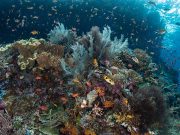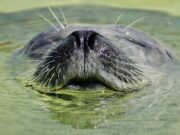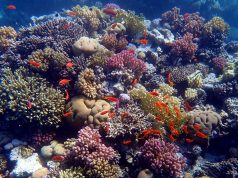Stingrays can calculate. Scientists have trained the rays to do simple adding and subtracting. (They learned addition quicker, just like children do.)
Take your citizen science to the next level with Operation Oyster. Divers are asked to incorporate oyster data gathering into their regular diving activities throughout the year.
Restoring whale numbers would mean more iron in the water from their poo, which would mean more phytoplankton, and more carbon dioxide taken up from the atmosphere. Whales once contributed to as much carbon removal as forests of entire continents.
What happens to baby turtles after they scramble off the sandy beaches where they are born and swim into the open ocean?
Researchers find dolphins to be far more similar to humans than previously thought.
For those who have ever observed monkeys and apes – our closest evolutionary cousins – in the wild, in a zoo,...
99.8% of shark fins come from Indo-Pacific: conservation efforts in Atlantic Ocean are working
People eat a lot of fish. Different sex-changing fish can follow several signals that prompt them to change sex. Some change from female to male at a fixed size or age. Often, fisheries will only harvest fish over a certain size. This means catching more males because they are usually bigger, which then skews the population towards female. Not enough males are then available to fertilise all the eggs produced by the females.
Metals like copper from agricultural runoff and marine paint leaching from boat hulls poses a threat to soft coral sea fans, especially in warming seas.
While plastics and microplastics are a well-known threat to the world's oceans, the effect of...
All clownfish start off as male, but can switch to female when circumstances allow, for example, when the only female present dies or disappears. In a new study, researchers found that the male-to-female sex-change occurs first in...
Scientists have used satellite tracking and a crime-scene technique to discover an important feeding ground for green turtles in the Mediterranean.
University of Exeter researchers measured "stable isotope ratios" - a chemical signature also...



























